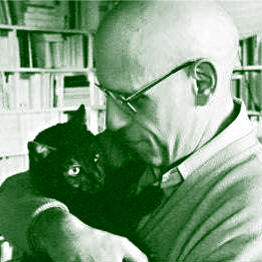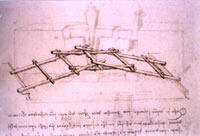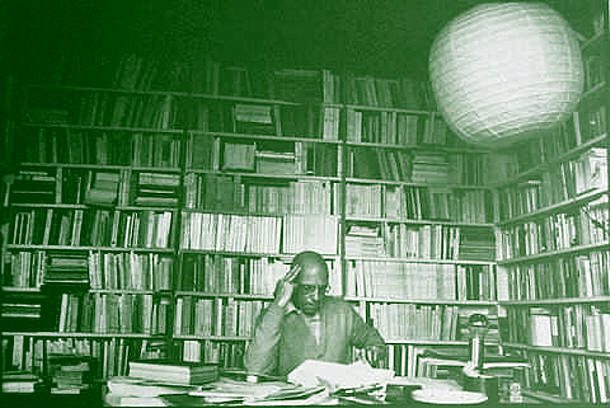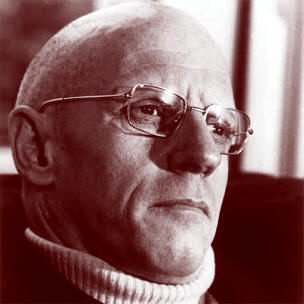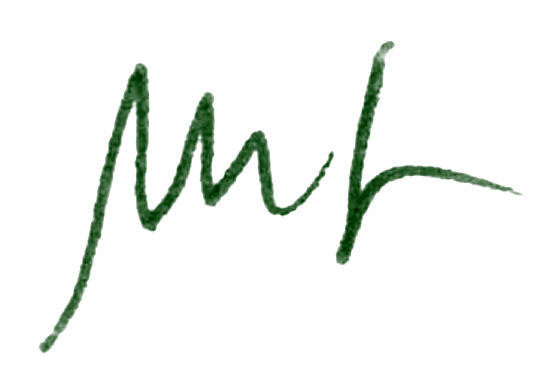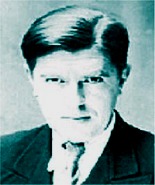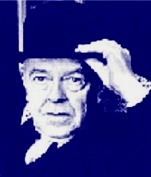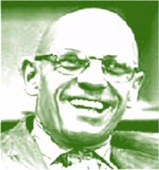|
FOUCAULT&MAGRITTE
paul
michel
foucault
the culture of the self
People know what they do
frequently they know why they do what they do
but what they don't know is what ' what
they do ' does
les gens savent ce qu'ils font
...
SELF-ATTACHMENT IS THE FIRST SIGN OF MADNESS
...
Death as the destruction of all things no longer had meaning
when life was revealed to be a fatuous sequence of empty words
the hollow jingle of a jester’s cap and bells
...
The gesture that divides madness is the
constitutive one
not the science that grows up in the calm
that returns after the division has been made
madness and
civilization: a
history of insanity
in the age of reason - 1961
L’uomo di cui ci parlano
e che siamo invitati a liberare è già in se
stesso l’effetto di un assoggettamento ben più profondo di lui.
Un’anima lo abita e lo conduce all’esistenza, che è essa stessa un
elemento della signoria che il potere esercita sul corpo. L’anima,
effetto e strumento di una anatomia politica; l’anima, prigione del
corpo.
.
Le problème politique
le plus général n’est-il pas celui de la vérité ?
.
Le pouvoir disciplinaire
en
effet est un pouvoir qui, au lieu de soutirer et de prélever, a pour
fonction majeure de 'dresser' ; ou sans doute, de dresser pour mieux
prélever et soutirer davantage.
.
Ne me demandez pas
qui je suis et ne me dites pas de rester le
même : c'est une morale d'état civil ; elle régit nos papiers.
Qu'elle nous laisse libre quand il s'agit d'écrire.
.
Je peux bien aller au bout du monde, je peux bien me tapir, le matin, sous mes couvertures, me faire
aussi petit que je pourrais, je peux bien me laisser fondre au
soleil sur la plage, il sera toujours là où je suis.
Il est ici irréparablement, jamais ailleurs. Mon corps, c'est le
contraire d'une utopie, ce qui n'est jamais sous un autre ciel, il
est le lieu absolu, le petit fragment d'espace avec lequel, au sens
strict, je fais corps.
.
I don't feel that it is necessary to know exactly what I am
The main interest in life and work is to become someone else
that you were not in the beginning
I don't feel that it is necessary to know exactly what I
am. The main interest in life and work is to become someone else that you were
not in the beginning. If you knew when you began a book what you would say at
the end, do you think that you would have the courage to write it? What is true
for writing and for a love relationship is true also for life. The game is
worthwhile insofar as we don't know what will be the end. My field is the
history of thought. Man is a thinking being.
...
Il solo segno di riconoscimento che
si possa testimoniare a un pensiero … è precisamente di
utilizzarlo, di deformarlo, di farlo stridere, gridare.
Allora, dicano pure i commentatori se si è o non si è
fedeli, ciò non ha alcun interesse .
...
Enfermé dans le navire, d’où on n’échappe
pas
le fou est confié à la rivière aux mille bras, à la mer aux mille chemins,
à cette grande incertitude extérieure à tout. Il est prisonnier au milieu de la
plus libre, de la plus ouverte des routes : solidement enchaîné à l’infini
carrefour ...
histoire de la folie à l'âge classique - folie et déraison 1961
...
Je
voudrais qu’un livre
au moins du côté de celui qui l’a
écrit, ne soit rien d’autre que les phrases dont il est fait ; qu’il
ne se dédouble pas dans ce premier simulacre de lui-même qu’est une
préface, et qui prétend donner sa loi à tous ceux qui pourront à
l’avenir être formés à partir de lui. Je voudrais que cet
objet-événement, presque imperceptible parmi tant d’autres, se
recopie, se fragmente, se répète, se simule, se dédouble,
disparaisse finalement sans que celui à qui il est arrivé de le
produire, puisse jamais revendiquer le droit d’en être le maître,
d’imposer ce qu’il voulait dire, ni de dire ce qu’il devait être.
de
l'homme à l'homme vrai, le chemin passe par l'homme fou
histoire de la folie à l'âge classique 1972
.
Se nel sonno la coscienza si addormenta
nel sogno l'esistenza si sveglia
.
il sapere non è fatto per comprendere
ma è fatto per prendere posizione
.
IT CERTAINLY
LOOKS LIKE A PIPE
FOUCAULT AND THE CALIFORNIA
ACHIEVEMENT TEST
Murray Ross University of British Columbia
In I’m not Lying, This is
Not a Pipe James Palermo ingeniously reworks a familiar theme, namely that
culturally biased standardized tests threaten to limit the educational
opportunities of minority children. Palermo argues that Foucault’s
meditation on
Magritte’s This is Not a Pipe reveals “the ambiguous,
contradictory and non-representational relationship between words and things.”
Once this relationship is understood teachers can begin to develop the
critical aesthetic consciousness necessary to unmask the illegitimate
practices of normalization, subjectification and exclusion associated with
the CAT and tests like it.
The most intriguing and
original elements of Palermo’s argument center on the contradictory “message”
of This is Not a Pipe. Given the conventions of representational art, images
are meant to represent, while language is meant to fix the reference of the
image. That Magritte breaks with these conventions is seen by Palermo to be
of great significance. He likens the painting’s contradictory message to a
lie “which repeat[s] within us the agonizing experience felt when we think
the friend conversing with us is lying.” I do not think it is unfair to
suggest Palermo is exaggerating here. There are many speech acts besides
lies that convey mixed messages. Puns, for example, or jokes are frequently
based on an inversion or violation of the conventions and background
assumptions that make our various language games intelligible to us. The
people I asked take the painting to be a quirky and whimsical work; most
felt the contradiction between inscription and image to be too transparent
to qualify as a lie, or even an attempt to lie. I think Palermo is too quick
to speak of lies, both with respect to the painting and the CAT. More of
this later.
The heart of Palermo’s
discussion of This is Not a Pipe centers on the distinction between
resemblance and similitude. Unfortunately, Palermo is not very clear on just
what the distinction is between these two, and the excerpts from Foucault’s
discussion are too brief to clarify sufficiently what special sense is being
attached to these terms. I am not sure, for example, what sort of hierarchy
is being alluded to, or how representation rules over resemblance. I suspect
that the meaning Foucault gives to resemblance presupposes a particular
fixed ontology where words somehow correspond to things in the world, while
similitude refers to relations between words or statements, and allows for a
variety of interpretations. According to a fixed correspondence relation
between words and things, there are right and wrong ways of speaking, in
particular, ways of speaking that fail to match up with reality in the
proper way. In a relation of similitude, statements are true not by virtue
of some correspondence with things in the world, but relative to a language.
I might well be wrong about this for I found the discussion obscure. The
upshot appears to be that the CAT assumes a fixed correspondence between
words and things which inevitably produces among test-takers an arbitrarily
designated category of losers, individuals who are judged sub-normal or
abnormal in virtue of the different language they use. Presumably it is the
arbitrary nature of this category that makes the designation a lie. Palermo
draws several conclusions from Foucault’s discussion:
1. Plastic imagery and
discourse can be shown as incommensurable sign systems.
These are interesting and
provocative claims, but their meaning too is less than perfectly clear. The
few sketchy comments on similitude and resemblance do little to convince me
that the concept of incommensurability is appropriate in this context. For
one thing, it is not clear whether Palermo is saying imagery and language
are incommensurable sign systems or merely that they can be. Since
incommensurability is usually taken to be an all or nothing affair I find
these conclusions puzzling. It is easy to accept the second claim that
artistic images need not have a narrowly fixed reference, but we do not need
Foucault to tell us this. If the first claim amounts to anything more than
“the meaning of paintings is harder to pin down than the meaning of words,”
I would have liked a bit more argument. If the plastic images and language
of the CAT are literally incommensurable sign systems, then it must be that
everyone will do poorly on the CAT, including the designers of it, and that
is clearly not what Palermo is saying. If Palermo’s remarks concerning
incommensurability amount to nothing more than the claim that
African-American children will have difficulty interpreting the test, then I
do not see how Foucault’s distinction between similitude and resemblance
illuminates the problem of test bias more vividly than the standard
sociological critique.
A word or two about
disciplinary power seems in order.
In Discipline and Punish Foucault remarks
that
the workshop, the school,
the army were subthe workshop, the school, the army were subject to a whole
micropenality of time (latenesses, absences, interruptions of tasks), of
activity (inattention, negligence, lack of zeal), of behavior (impoliteness,
disobedience), of speech (idle chatter, insolence).
The issue, of course, is
whether such standards of conduct, activity, and speech are essentially
implicated in practices of domination and repression. Must norms of academic
competence (or readiness) inevitably be part of a normalizing practice which
by its nature mistreats schoolchildren or in some way brings them harm? It
is a one-sided analysis, Foucault says, to describe power only in its
negative functions of exclusion, repression, and censorship, for power also
produces abilities. Disciplinary power increases the force or productive
capacity of the body at the same time it diminishes the individual’s power
to resist. The strategies of hierarchical observation, normalizing judgment
and examination yielded in schools a remarkable increase in achievement,
most often by restricting the student’s power to resist. Is this evil?
Foucault himself admits the answer will vary case by case.Despite Foucault’s
disavowals in interviews, Foucault’s genealogies are often seen as protests
against the disciplinary effects of hierarchical judgment or examination,
and nothing more. Freedom is a good in itself against which the discipline
of schools, asylums, and leprosariums is an offense. Foucault makes plain,
however, that he does not believe all educational norms must be, in some
way, arbitrary, or based on false premises, or compromised by the will to
power. Nonetheless, it is apparent that some educationists ignore in
Foucault’s writing this tension between the potentially oppressive character
of normalizing discourse and the unproblematic nature of our trying to make
accurate judgments about children’s intellectual growth. Foucault once said
in an interview:
Let us also take something
that has been the object of criticism, often justified: the pedagogical
institution. I don’t see where evil is in the practice of someone who, in a
given game of truth, knowing more than another, tells him what he must do,
teaches him, transmits knowledge to him, communicates skills to him. The
problem is rather to know how you are to avoid in these practices — where
power cannot not play and where it is not evil in itself — the effects of
domination which will make a child subject to the arbitrary and useless
authority of a teacher
Schools are places, says Foucault, “where power cannot not play and where it
is not evil in itself.” Our task is to figure out how to avoid subjecting
children to arbitrary and useless authorities, not all authorities.
Is the CAT implicated in a
lie, part of a normalizing discourse that fabricates, rather than merely
identifies, an inability to switch codes, as Palermo insists? Palermo
accepts that schools should teach Standard English to African American
children because these children need to be able to translate from the
dominant code to their own. One need not think Standard English is superior
to recognize the disadvantage that falls to those children unfamiliar with
it. Thus, an inability to switch codes is a real inability, not an imagined
one. I am, therefore, at a loss to understand how Palermo can say “the
language of discursive practices creates the reality it describes.”
It has been observed that
there is an American Foucault and a French Foucault. Rorty says the American
version “can be read, with only a little strain, as an up-to-date version of
John Dewey…with most of the Nietzscheanism drained away.” The American
Foucault is equally concerned with injustice, but has not hobbled his
critique with the same ambiguities and paradoxes that beset the Nietzschean
Foucault. The American Foucault is more coherent, though less dramatic. I
think Palermo’s paper is written in the spirit of the French Foucault, and
is as a result more dramatic than coherent. The story he tells has been told
before, but less dramatically, in the sociological critique. It is an
important story to tell again, and some of the Nietzscheanism, at least, is
salutary. Philosophers such as Rorty, Taylor and Walzer prefer the American
Foucault, but admit the French Foucault is correct enough to be disturbing.
ed.uiuc.edu
...
Disciplinary power, on the other
hand, is exercised through its invisibility; at the same time it
imposes on those whom it subjects a principle of compulsory
visibility. In discipline, it is the subjects who have to be seen.
Their visibility assures the hold of the power that is exercised
over them.
La pipe d’en haut est sans coordonnées.
L’énormité de ses proportions, rend incertaine sa localisation … :
est-elle, cette pipe démesurée, en avant du tableau dessiné, le
repoussant loin derrière elle ? Ou bien est-elle en suspens juste
au-dessus du chevalet, comme une émanation, une vapeur qui viendrait de
se détacher du tableau, – fumée d’une pipe prenant elle-même la forme
et la rondeur d’une pipe … ? Ou bien ne pourrait-elle pas supposer, à
la limite, qu’elle est en arrière du tableau et du chevalet, plus
gigantesque alors qu’elle ne paraît ; elle en serait la profondeur
arrachée, la dimension intérieure crevant la toile.
What, do you imagine that I would
take so much trouble and so much pleasure in writing, do you think that I
would keep so persistently to my task, if I were not preparing - with a
rather shaky hand - a labyrinth into which I can venture, in which I can
move my discourse, opening up underground passages, forcing it to go far
from itself, finding overhangs that reduce and deform its itinerary, in
which I can lose myself and appear at last to eyes that I will never have to
meet again. I am no doubt not the only one who writes in order to have no
face. Do not ask who I am
and do not ask me to remain the same: leave it to our bureaucrats
and our police to see that our papers are in order. At least spare
us their morality when we write. Discourse is not life its time is not your time. in it, you will not be reconciled to death. you
may have killed God beneath the weight of all that you have said but don't
imagine that with all that you are saying you will make a man that will live
longer than he.
archaeology of knowledge - 1972
N'oubliez pas d'inventer votre vie
music is tragedy pathos death.
It is the whole game the trembling
to the point of suicide.
If music is not that if it does not
overtake and pass the limits
it is nothing.
Nothing is
fundamental. That is what is so interesting in
the analysis of society. That is why nothing irritates me as much as these
inquiries - which are by definition meptaphysical - on the foundations
of power in a society or the self-institution of a society, etc.
These are not fundamental phenomena. There are only reciprocal
relations, and the perpetual gaps between intentions in relation
to one another.
mf
Panopticon metafora
dell’invadenza con cui la società moderna si impegna a
disciplinare e monitorare la vita dei suoi cittadini
mf
left its old tragic heaven and became the
lyrical core of man
his invisible truth his
visible secret
alors que c'est par accident que le
criminel est un despote
The despot is a criminal by his status whereas the criminal is a
despot by accident
Abnormal: Lectures at the Collège de France 1974-1975
personally I've never met any intellectuals.
I've met people who write novels, others who treat the sick.
people who work in economics and others who compose electronic
music. I've met people who teach, people who
paint, and people of whom I have never really understood what they do.
But intellectuals ?
Never.
La dimensione del 'noi'
non è qualcosa che ci sia stato assegnato preliminarmente, per natura, ma un
obiettivo da problematizzare di continuo per renderne possibile la «futura
costruzione». E la biopolitica non è il margine entro cui sono confinate le
nostre pratiche politiche, ma il limite che occorre oltrepassare per
assumere, nei confronti del potere, un atteggiamento «affermativo» e non
solo «difensivo».
comunicazione-guerriglia
il controllo del comportamento .. per perpetuare il
potere.
...
Il potere, lungi dall’impedire il sapere, lo produce.
Se si è potuto costituire un sapere sul corpo
è stato attraverso un insieme di discipline militari e
scolastiche.
È solo a partire da un potere sul corpo che un sapere
fisiologico, organico era possibile.
...
The intellectual
was rejected and persecuted
at the precise moment
when the facts became incontrovertible
when it was forbidden
to say that the emperor had no clothes
The strategic adversary is fascism
the fascism in us all - in our heads and in our
everyday behavior
the fascism that causes us to love power
to desire the very thing that dominates and exploits us
mf
Forse oggi l’obiettivo principale non è di scoprire che cosa siamo
ma piuttosto di rifiutare quello che siamo
Dobbiamo immaginare e costruire ciò che potremmo diventare
MF
manet
vu par foucault
L'homme est une invention récente dont
l'archéologie de notre pensée montre aisément la date récente
. Et peut-être la fin prochaine .
.
Friedrich Nietzsche was the first to release the desire to know from the
sovereignty of knowledge (connais- sance) itself: to re-establish the
distance and exteriority that Aristotle cancelled, a cancellation that had
been maintained by all philosophy.
Jamais la psychologie ne pourra dire sur la folie la vérité
la nostra
memoria è sempre audiovisiva
.
Il filosofo non ha ruolo nella
società. Il suo pensiero non
può essere collocato in rapporto al movimento attuale del gruppo.
Socrate ne è un eccellente esempio: la società ateniese non ha
saputo riconoscegli che un ruolo sovversivo, il suo mettere in
questione le cose non poteva essere ammesso dall’ordine costituito.
In realtà, è dopo un certo numero di anni che si prende coscienza
del posto di un filosofo, insomma gli si assegna un ruolo
retrospettivamente.
.
Un front de bataille traverse la société
tout entière, continûment et en permanence, et c'est ce front de
bataille qui place chacun de nous dans un camp ou dans un autre. Il
n'y a pas de sujet neutre.
On est forcément l'adversaire de quelqu'un.
Forse una giorno non sapremo più
esattamente
che cosa ha potuto essere la follia
noam chomsky
for example, derides Foucault's apparent relativism, his failure to morally
evaluate political conditions. In this paper, Paul Patton stakes out the
opposing position. "Three centuries ago
certain fools were astonished
because Spinoza wished to see the liberation of man, even though he did not
believe in his liberty or even in his particular existence. Today, new fools,
or the same ones reincarnated, are astonished because the Foucault who had
spoken of the death of man took part in political struggle."
Need a quick primer on Postmodernism
and wonder how anyone can read Michel Foucault?
You must be mad
Il aimait se situer entre l'obscurité et la lumière, entre l'intérieur et l'extérieur,
entre la vie et la mort. Son travail tout au long de sa vie, ne cessa de tenter
de comprendre la frontière entre le visible et l'invisible pour découvrir l'invisible
du visible. Ce n'est pas pour rien qu'il aimait la peinture de Manet. En
analysant le tableau Le Balcon il expliquait que les trois personnages
regardaient avec intensité quelque chose que ceux qui regardaient ne pouvaient
voir. " Nous, nous ne voyons rien ". Comment voir en effet ? Comment disséquer
sous les discours les enjeux du pouvoir, comment comprendre le langage derrière
le texte ?
Foucault ou l'homme qui nous
dessille les yeux.
radiofrance.fr - 81.220.84.140/hommages/foucault
Qui définit le moment où j'écris?
per
sognare non bisogna chiudere gli occhi - bisogna leggere
in any given culture
and at any given moment there is always only one 'episteme'
that defines the conditions of possibility of all knowledge
whether expressed in theory or silently invested in a practice
...
The function proper to knowledge is not seeing or demonstrating
it is interpreting
...
It is
comforting, however, and a source of profound relief to think that
man is only a recent invention, a figure not yet two centuries old,
a new wrinkle in our knowledge, and that he will disappear again as
soon as that knowledge has discovered a new form.
the order of things
- an archaeology
of the human sciences -
1966
BIBLIOGRAFIA
2018
les aveux de la chair - postumo
2011
IL CORAGGIO DELLA VERITA
2008
BISOGNA DIFENDERE LA SOCIETA
IL CORPO LUOGO DI UTOPIA
DISCIPLINE POTERI VERITA
2007
IL SAPERE E LA STORIA
CONVERSAZIONI
VERITA E FORME GIURIDICHE
2003
2002
2001
1988
1981
unilibro
INTERVISTA 28.11.1971 - PERDUTA E
RITROVATA -
https://youtu.be/qzoOhhh4aJg
eugene wolters - critical-theory.com - 2014 - fonselders.eu -
freedom and knowledge
interview de 1979 - fb/mf
non sono né un filosofo né uno
scrittore
Non compongo un'opera
faccio ricerche che sono ad un tempo
ricerche storiche e ricerche politiche
gli archivi della Bastiglia ...
questo
luogo calmo e silenzioso era uno dei rifugi preferiti di Michel Foucault
. utenti.multimania.it .
I wasn't always smart,
I was actually very stupid in school ... There was a boy who was very
attractive who was even stupider than I was. And in
order to ingratiate myself with this boy who was very beautiful, I began to
do his homework for him - and that's how I became smart, I had to do all
this work to just keep ahead of him a little bit, in order to help him. In a
sense, all the rest of my life I've been trying to do intellectual things
that would attract beautiful boys .
| ||||||||||||
|
futuristi italiani e internazionali www.dinamopress.it/news/linedito-di-foucault - Les aveux de la chair - postumo http://web.mclink.it/MC4200/picturage/futurismo/futurismo.htm http://utenti.romascuola.net/bramarte/futurismo http://futurismo.freeservers.com www.mart.trento.it CISF
links
www.filosofico.net/foucault.htm
- https://youtu.be/BBJTeNTZtGU
altri autori
| ||||||||||||
